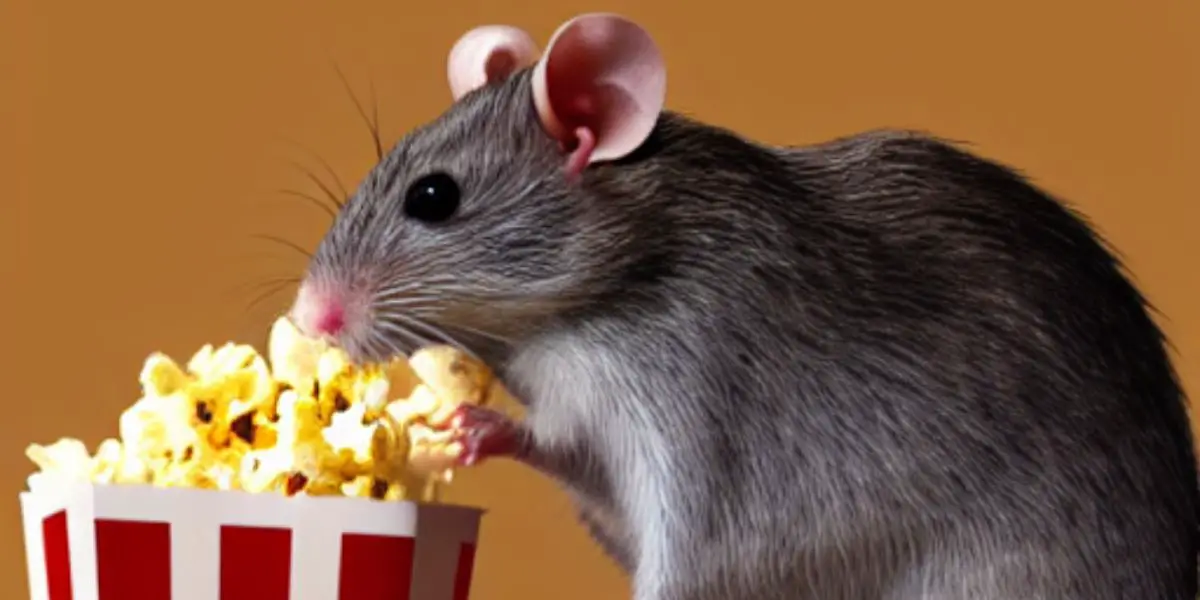There is a lot of debate over what rats can and cannot eat. Some people believe that they can eat just about anything, while others think they have very discerning palates. So, can rats eat popcorn?
Is It Safe To Feed Rats Popcorn?
Rats can safely eat plain air-popped popcorn, which does not contain any butter, salt, sugar, or additional flavorings. Since rats are omnivores, they can eat a wide variety of plant- and meat-based foods. However, it is important to ensure they are not fed too much popcorn since this can lead to obesity.
When they are in the wild, rats tend to get a lot of exercise. This is because they are forced to move around quickly to scavenge for food and escape predators.
On the other hand, pet rats live a more sedentary lifestyle since they spend the majority of their time within a cage. For this reason, obesity in pet rats is a serious problem that pet owners need to be aware of.
Fortunately, this can be avoided. One of the best ways to prevent obesity is by closely monitoring your pet rat’s diet to make sure they are consuming moderate portions of nutritious food. Popcorn is a high-carb snack for rats since it contains approximately 387 calories in each 100 g serving. This means that you need to regulate how much and what type of popcorn you are serving to your tiny pet.
For information on all rodents, check out our article – What Type of Rodents Can Eat Popcorn?
Can Rats Eat Hulled Popcorn?
Popped popcorn contains two main parts: a white fluffy portion and a rigid hull that is brown or black. Rats should only be fed on the white fluffy part since the tough hulls can lead to choking, especially in mice.
TIP – If you don’t want to go through the trouble of separating the soft white portion of popcorn from the hard hull, then you can opt to purchase kernel-less popcorn.
Can Rats Eat Buttered Popcorn?
Buttered popcorn is yellow, and it contains a high amount of fat and salt, which is quite unhealthy for pet rats. While rats might enjoy the taste of butter, they should not be fed with buttered popcorn since it leads to obesity. According to an article in EZNC, the normal weight of a rat is about 250g – 400g for females, while the ideal weight for males is 300g – 600g. Moreover, some of the negative health effects of obesity in rats include:
- Foot Problems
- Shorter life expectancy
- Increased risk of tumors
- Reproductive challenges
Can Rats Eat Salted Popcorn?
Since rats are quite sensitive to salt, they should not be fed with salted popcorn because it can lead to dehydration. High salt intake has also been shown to increase blood pressure in rats and eventually lead to kidney damage.
Is Popcorn Good for Rats?
When served in moderation, plain kernel-less popcorn offers some health benefits to rats. Here are some of the nutrients found in popcorn that are healthy for a rat’s growth and development:
Vitamin B6: Assists in protein metabolism and growth of hair.
- Fiber: Assists in digestion.
- Vitamin E: Has antioxidant properties.
- Iron: Helps in red blood cell production.
- Vitamin A: Maintains healthy eyesight.
- Potassium: Prevents high blood pressure.
- Magnesium: Regulates sugar levels in the rat’s body.
- Phosphorous: Helps rebuild cells.

How to Feed Rats Popcorn
Rats are extremely intelligent. Subsequently, they are listed as being one of the top ten smartest pets to keep. When served as a treat, popcorn is a great tool that can be used to teach tricks, reinforce good behavior, and promote physical exercise for your rat.
For instance, placing popcorn in a feeding toy with puzzles or mazes is a fun way to challenge your pet rat. This mode of feeding encourages them to use their physical and mental abilities to solve the puzzle and get the prize.
TIP – Since rats are natural foragers in the wild, you can also build on this innate skill by mixing small bits of popcorn with small pieces of cardboard. This is a stimulating challenge that forces your pet rat to search for the treat within the mixture.
Another fun way to challenge your pet is by placing popcorn treats at strategic points within a multi-level cage. This is a great way to keep your rat physically active since they will be running up and down to get the treats placed at different locations within the cage.
Curious if turtles can eat popcorn?
What Should You Feed Rats?
Experts advise that 80% of your pet rat’s diet should comprise commercially available pellets, while the remaining 20% should comprise grain, vegetables, and other assorted types of healthy foods.
High-quality commercial rat pellets contain the right composition of nutrients, vitamins, and minerals that your pet needs to grow and thrive. Some additional types of food that are safe for your rat include:
- Grains: Walnuts, oatmeal, sunflower seeds, wholegrain crackers, whole-wheat pasta and almonds.
- Vegetables: broccoli, peas, parsley, carrots and cabbage.
Moreover, you should also make sure that your rat has access to clean drinking water.
What Should You Not Feed Rats?
Certain vegetables and snacks are toxic to rats and can lead to serious health complications. Here are some of the items to avoid:
- Caffeine
- Chocolate
- Wild Insects
- Apple seeds
- Lemon peels
- Raw red cabbage
- Green potato skins
- Raw Brussels sprouts
- Everything In Moderation

Rats are omnivores and will eat nearly anything that they are fed. As a responsible pet owner, you should make sure that your rat’s diet contains the right amounts of nutrients that your pet needs for growth and survival.
As a general rule, too much of anything is bad. Even while plain popcorn can be a fun treat to give your pet rat once in a while, you should be careful to make sure that your rat does not consume too much of it, or else they will become obese.
Next, check out if wild birds can eat popcorn.
Sources
http://www.vetstreet.com/our-pet-experts/most-common-obese-exotic-pets-no-4-rats
http://www.eznc.org/CMS/Newsarchive/show.do?ctx=7795,169951,463185
https://www.healthline.com/nutrition/popcorn-nutrition-and-health#
https://www.thesprucepets.com/smartest-pets-4174884
https://www.petmd.com/exotic/care/pet-rats-all-about-fancy-rats#




